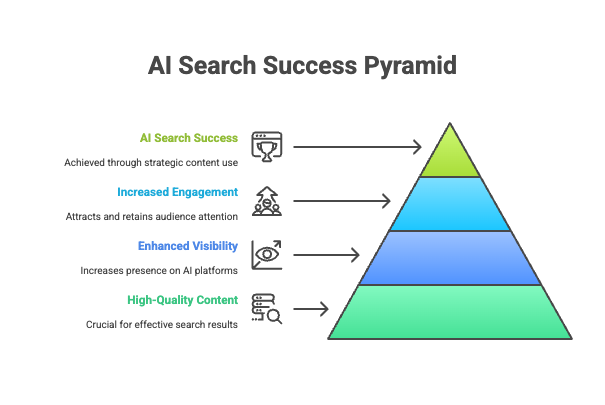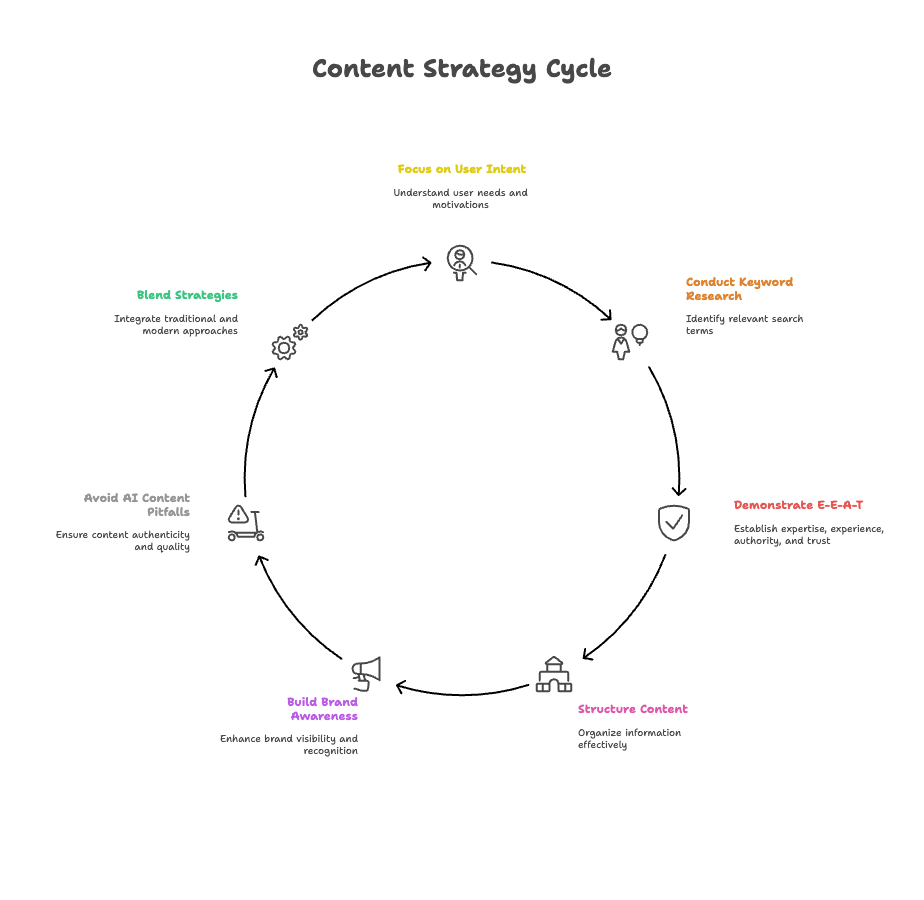Making Content King in AI Search
Welcome to the second instalment of my analysis of the challenges and opportunities presented by AI search.
This issue is about how Content leverages AI search results.
I’ve been talking to people who fear that all their content needs to be jettisoned because the paradigm has shifted. Let me put your mind at rest. Most of the best content practices from 2024 are equally applicable in 2025. But you shouldn’t rest on your laurels, as there’s a real danger your website traffic will plummet.
A seismic shift is happening in search.

Focus on user intent
If you have been stressing user intent in your content strategy, then double down on it. If you weren’t, you need to start now. Because if you don’t understand your customers, your digital marketing will fall flat on its face. Go back to one of the basic rules of writing: write for people. If that’s too difficult, write for a person. I’m sure you can see why building customer or user personas is even more essential for your content writing in 2025.
Keyword Research lives!
You may have read elsewhere that keyword research is dead. That old chestnut is as wrong today as it has always been. Whether people use voice or a good old-fashioned keyboard, people are still using keywords. I find it helpful to think of a keyword (I prefer ‘key phrase’ but Google says otherwise) as the core theme of a search or AI prompt.
However, simple keyword matching is long, long gone. Keyword clustering isn’t that new, either, but it helps form the structure of our pages. Use long-tail keywords, their variations and related keywords as you create high-quality, authoritative content.
Demonstrate E-E-A-T
High-quality, authoritative content is the third factor you must hit if your business is going to appear in AI search results. That’s where E-E-A-T comes in. E-E-A-T, according to Google, stands for Experience, Expertise, Authoritativeness, and Trustworthiness.
High-quality content, in Google's Search Quality Evaluator Guidelines, demonstrates a high level of E-E-A-T. So, for success in AI search, demonstrate you or your organisation’s E-E-A-T, plus build topical authority by including your own unique data, facts and context.
Today, more than ever, you should go beyond simply stating information. Bolster your content with proprietary data, original research findings, and specific, verifiable facts that aren't readily available elsewhere. This approach distinguishes your work from the vast amount of readily available information and encourages others to view you as a primary source of knowledge on the topic.

Structure is king
Best practice still recommends clear headings, bullet points, numbered lists and a list of content. It’s really common sense, ensuring it's easy for people, search engines and Large Language Models to digest your content. And, while on content structure, try keeping Q&As tight and to-the-point—some recommend 40-60 words—to give you a better chance of appearing in AI overviews.
Build your Brand
AI search spreads its wings from your website and internal links. Building your brand is key to success, harnessing PR, social media and other relevant platforms. Careful and creative content repurposing can ease the burden of spreading your digital marketing budget.
Beware AI-generated content
There’s a great temptation to use AI to generate reams of content quickly. It’s so easy to create mediocre websites these days, but be careful not to get hooked into producing quantity over quality.
I’ve seen a number of sites with considerable quantities of AI content (some even with 100% AI content) and they’ve failed to rank. My recommendation for some time has been to use human-written content. It was a slightly controversial recommendation, as Google had stated that it didn’t exclude AI content from its search results; my argument has been that even with that statement, human content written or edited by a professional should be of better quality and should outrank AI content.
But even that has changed. Google’s John Mueller dropped this bombshell recently:
“The Lowest [quality] rating applies if all or almost all of the [main content] on the page (including text, images, audio, videos, etc) is copied, paraphrased, embedded, auto or AI generated, or reposted from other sources with little to no effort, little to no originality, and little to no added value for visitors to the website. Such pages should be rated Lowest, even if the page assigns credit for the content to another source.” [emphasis added]
https://searchengineland.com/google-quality-raters-content-ai-generated-454161. The whole piece is worth reading.
So, that’s absolutely clear. Do not use AI for the final draft of your website content—keep it for your offline and internal copy. Google is still a near-monopoly in search, but having the best quality content will almost certainly help it appear in the new AI search engines.
Securing your rankings—blending old and new strategies
In these early days, AI search is a rapidly moving target. It presents opportunities for businesses that keep up to date and adapt their content, content strategy and SEO. However, just as important, AI search results do not appear on every search on Google and other established search engines.
You need to keep up to date with what’s happening in AI search and the potential effect on your search performance. But, at the same time, many established best practices for content still apply, so be careful when reworking existing content, especially when that content is performing well in traditional organic search rankings.
My recommendation is to conduct a thorough content audit on your website right away, with additional attention to the technical SEO demands I’ll be covering next time.
Ask me about a content audit for AI and conventional search or an AI search strategy.
Thanks for reading. Please email me at david@davidrosam.com if you have any questions or comments.
Best
David
David Rosam Digital Marketing
